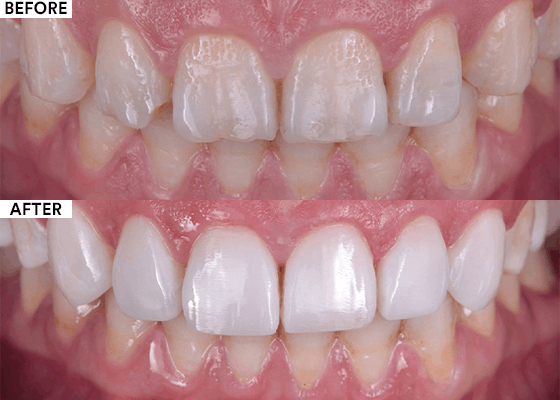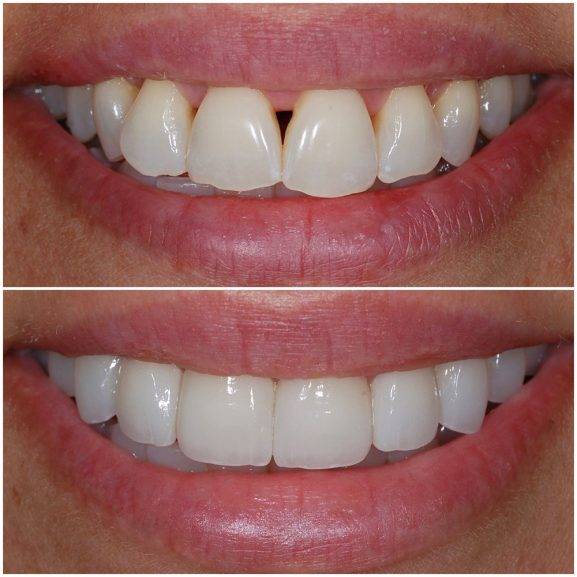
Imagine this: You catch a glimpse of your reflection in the mirror and notice that your teeth are not as bright and flawless as you’d like them to be. Perhaps there’s some discoloration or maybe they’re slightly misaligned. You long for a radiant smile that exudes confidence, but where do you start? Well, Veneers might just be the solution you’ve been searching for.
Veneers are thin shells that can transform the appearance of your teeth, addressing various dental issues with remarkable results. They offer a natural-looking enhancement that can give you the smile of your dreams. However, it’s crucial to approach veneers with careful consideration due to their irreversible nature.
We’ll explore everything from their benefits to what to expect during an appointment. So, buckle up and get ready to discover how veneers can revolutionize your smile!
Different Types of Veneers Teeth
Porcelain veneers, composite resin veneers, and Lumineers are three common types of dental veneers that offer unique benefits and considerations.
Porcelain Veneers:

- Custom-made and highly durable.
- Provide a natural-looking appearance.
- Stain-resistant, maintaining their color over time.
- Requires the removal of a small amount of tooth enamel for placement.
- Typically requires local anesthetic during the procedure.
Composite Resin Veneers:

- More affordable compared to porcelain veneers.
- Can be completed in a single visit to the dentist.
- Less stain-resistant than porcelain veneers.
- Can be repaired if damaged or chipped.
Lumineers:

- Offer a minimally invasive option with ultra-thin veneers.
- Require minimal or no tooth preparation before placement.
- Reversible procedure as it doesn’t involve removing tooth enamel.
- Suitable for patients seeking conservative treatment options.
When considering veneers teeth, it’s essential to weigh the pros and cons of each type based on your specific needs and preferences. Traditional porcelain veneers provide excellent durability and aesthetics but may involve more extensive preparation. Composite resin veneers offer affordability but may require more maintenance over time. Lumineers provide a conservative approach but may not be suitable for everyone.
Consulting with a qualified dentist will help determine which type of dental veneer is most suitable for achieving your desired smile transformation. They can assess your oral health, discuss treatment options, and guide you toward making an informed decision.
Remember to discuss any concerns or questions you have about the different types of dental veneers with your dentist before proceeding with treatment.
Advantages of Veneers Teeth
Veneers can instantly transform the color, shape, and size of teeth. They provide a long-lasting solution for cosmetic dental concerns. With proper care, veneers can resist staining from food and drinks. The application process is relatively quick and painless.
-
Veneers offer a versatile dental restoration option that can address various aesthetic issues with your teeth.
-
Dental veneers, also known as porcelain veneers, are custom-made shells that are bonded to the front surface of your natural teeth.
-
By choosing the right shade of veneer, you can achieve a brighter and whiter smile while maintaining a natural look.
-
Veneers are an excellent choice for individuals with chipped, cracked, or worn-down teeth as they can effectively restore their appearance.
-
If you have gaps between your teeth or unevenly shaped teeth, veneers can help create a more uniform and symmetrical smile.
-
Unlike removable veneers or other temporary solutions, dental veneers provide a permanent transformation that lasts for many years.
-
With regular brushing, flossing, and routine visits to your cosmetic dentist, you can ensure the longevity of your veneers.
-
One advantage of dental veneers is that they do not require extensive tooth reduction compared to some other restorations.
-
Veneer placement typically involves minimal enamel removal while still achieving significant improvements in the appearance of your teeth.
-
Thanks to advancements in dentistry techniques and materials used for veneers, they now offer enhanced durability and strength.
Limitations of Veneers for Badly Damaged Teeth
Severely damaged teeth may require alternative treatments like crowns or implants. When teeth are extensively decayed, fractured, or have large fillings, veneers may not be the most suitable option. In such cases, dentists may recommend restoration procedures such as dental crowns or implants to restore the functionality and appearance of the teeth.
Veneer placement requires removing a small amount of enamel, which cannot be reversed. This irreversible process is necessary to ensure proper adhesion and fit of the veneers. While this removal is minimal and generally well-tolerated, it should be considered before opting for veneers. Dentists carefully evaluate the extent of enamel reduction needed to determine if veneers are appropriate for each individual case.
In some cases, orthodontic treatment may be necessary before getting veneers. Veneers can improve the appearance of misaligned teeth to some extent; however, if there are significant bite issues or overcrowding, orthodontic treatment might be required prior to getting veneers. Orthodontics can help align the teeth properly, creating a better foundation for successful veneer placement.
Regular maintenance is crucial to ensure the longevity of veneered teeth. While veneers are stain-resistant and can withstand normal wear and tear, they still require regular care and maintenance. Good oral hygiene practices like brushing twice a day with a non-abrasive toothpaste and flossing daily can help maintain the integrity of both natural teeth and veneered ones. Avoiding excessive consumption of staining agents like coffee or tobacco can prevent discoloration over time.
Overall, while veneers offer many benefits in improving the appearance of damaged teeth and addressing issues like discoloration or minor misalignment, their suitability depends on individual circumstances. Dentists will consider factors such as tooth condition, alignment issues, patient preferences, and long-term goals when determining whether veneers are the right choice. It is important to consult with a dental professional who can provide personalized advice and guide patients through the decision-making process.
Before and After Veneers Teeth
Before getting veneers teeth, it is crucial to undergo a thorough examination and consult with a dentist. This step ensures that the treatment is suitable for your specific dental needs.
Once you receive veneer treatment, you will notice a remarkable improvement in your smile’s aesthetic. Veneers have the ability to transform discolored or chipped teeth into a natural-looking set of pearly whites.
The process of placing veneers typically involves minimal discomfort during the procedure. Your dentist will carefully prepare your teeth by removing a small amount of enamel, allowing for proper adhesion of the veneers. This step ensures that the final result feels comfortable and looks seamless.
After the placement of veneers, you can expect several positive changes in your smile. Here are some notable before and after effects:
-
Enhanced Appearance: Veneers provide an instant boost to your smile’s appearance. They can effectively conceal various imperfections such as stains, chips, or gaps between teeth.
-
Improved Confidence: With their newfound flawless smile, many patients experience a significant increase in self-confidence. Veneers allow individuals to feel more comfortable showcasing their teeth when smiling or speaking.
-
Long-lasting Results: When properly cared for, veneers can last for many years, providing enduring beauty and functionality.
-
Easy Maintenance: Maintaining veneers is relatively simple. Regular oral hygiene practices such as brushing twice daily and flossing are essential to keep them looking their best.
-
Natural Look: Modern advancements in dental technology enable dentists to create veneers that closely resemble natural teeth in terms of color and texture. This ensures that your smile appears authentic and not overly artificial.
Considerations for Permanent and Expensive Veneers
Porcelain veneers are a popular option for enhancing dental aesthetics, but before making a decision, it’s important to consider several factors. Here are some key points to keep in mind:
-
Permanent alteration to tooth structure: The placement of porcelain veneers requires permanent alteration to the tooth structure. This means that a thin layer of enamel needs to be removed from the front surface of the teeth to make room for the veneers. It’s essential to understand that this alteration is irreversible.
-
Cost variations: The cost of porcelain veneers can vary depending on various factors such as material choice and location. Different materials may have different price ranges, so it’s crucial to discuss your options with your dentist and understand the costs involved.
-
Long-term investment: Permanent veneers are considered a long-term investment in enhancing dental aesthetics. They are designed to last for many years and provide durability compared to temporary veneers. However, proper care and maintenance are necessary to ensure their longevity.
-
Choose an experienced dentist: To achieve the best results with your porcelain veneers, it’s vital to choose an experienced dentist who specializes in cosmetic dentistry. A skilled professional will ensure that the custom-made veneers match your natural teeth color, set them properly, and minimize any potential risks or complications.
-
Stains and food restrictions: While porcelain veneers are resistant to stains, certain foods and beverages can still cause discoloration over time if consumed excessively or not properly maintained. It’s advisable to avoid excessive consumption of staining substances like coffee, tea, red wine, or tobacco products.
-
Regular dental visits: Maintaining regular dental visits is essential when you have permanent veneers installed. These visits allow your dentist to monitor the condition of your veneers, address any concerns promptly, and perform professional cleaning procedures that help maintain their appearance.
-
Removal and replacement: It’s important to understand that once you have porcelain veneers, they cannot be easily removed or replaced. If any issues arise, such as damage or discoloration, the veneers may need to be replaced entirely, which can involve additional costs and procedures.
Evaluating the Pros and Cons of Veneers
Now that we have explored the different types of dental veneers, discussed their advantages, and limitations, and examined the before and after effects on teeth, it’s time to weigh the pros and cons. Dental veneers offer a fantastic solution for enhancing your smile and boosting your confidence. They can transform your teeth by correcting imperfections such as discoloration, chips, or gaps. However, it’s important to consider a few factors before making a decision.
When deciding on veneers, it’s crucial to consult with a qualified dentist who can assess your specific needs. Take into account the permanence of veneers and their cost implications. Remember that while they provide long-lasting results, they do require regular maintenance and may need replacement over time. Ultimately, you should carefully evaluate whether veneers align with your goals for a beautiful smile.
Ready to take the next step towards achieving your dream smile? Schedule an appointment with our experienced dental team today!
FAQs
- Can anyone get dental veneers?
Yes! Dental veneers are suitable for most individuals who want to improve the appearance of their teeth. However, it is essential to consult with a dentist who can evaluate your oral health and determine if you are an ideal candidate for veneers.
- How long do dental veneers last?
With proper care and maintenance, dental veneers can last between 10-15 years. Regular brushing, flossing, and routine visits to the dentist will help prolong their lifespan.
- Are dental veneers reversible?
No, getting dental veneers is considered an irreversible procedure as a small amount of enamel is typically removed from the tooth surface before placing the veneer.
- Will my insurance cover the cost of dental veneers?
In most cases, dental insurance does not cover cosmetic procedures like dental veneers. However, every insurance plan is different; it’s best to check with your provider to determine if any coverage is available.
- Can I still eat and drink normally with dental veneers?
Yes, you can continue to enjoy your favorite foods and beverages with dental veneers. However, it’s important to avoid biting into hard objects or using your teeth as tools to prevent damage.





